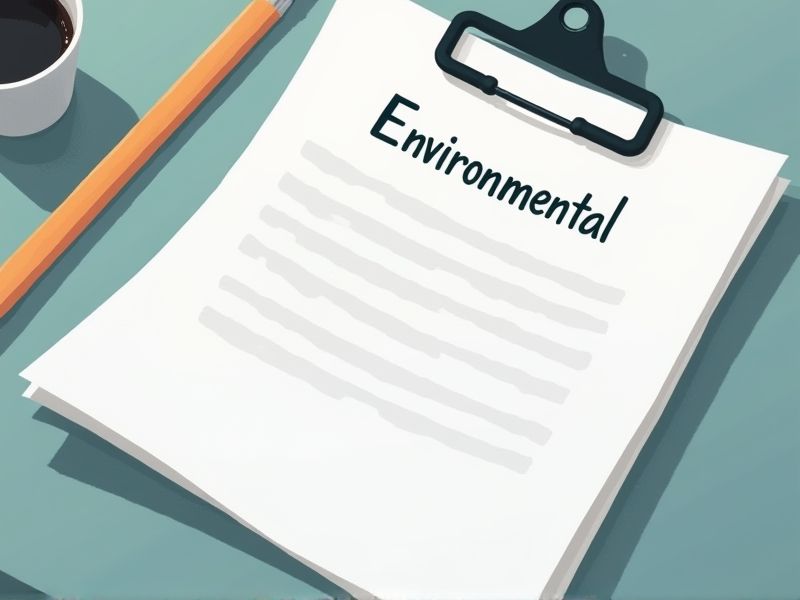
Environmental Health Technicians play a crucial role in ensuring public health and safety by monitoring environmental conditions and identifying potential hazards. Certification is essential because it equips these professionals with specialized knowledge of regulations, waste management, and hazard detection. It also ensures that they adhere to industry standards, enhancing their ability to assess and mitigate risks effectively. Key certifications necessary for an Environmental Health Technician include those focusing on hazardous material handling, environmental regulations, and safety compliance.
Registered Environmental Health Specialist/Registered Sanitarian (REHS/RS)
A Registered Environmental Health Specialist/Registered Sanitarian (REHS/RS) provides critical expertise in identifying and controlling environmental risks, which significantly enhances the effectiveness of an Environmental Health Technician's work. Their certification ensures adherence to state and federal regulations, fostering public trust and maintaining health standards. REHS/RS professionals bring extensive training in conducting health inspections and investigations, which equips technicians with improved methodologies and protocols. This collaboration leads to more accurate assessments and interventions, resulting in better protection of public health and environmental quality.
Certified Hazardous Materials Manager (CHMM)
CHMM certification provides an in-depth understanding of handling, storing, and disposing of hazardous materials, which is crucial for mitigating risks in environmental health settings. An Environmental Health Technician with CHMM credentials can better ensure compliance with federal and state regulations, reducing legal liabilities for their employers. The certification equips technicians with the knowledge needed to effectively manage emergency situations involving hazardous substances, thereby protecting public health. Employers seek CHMM-certified professionals to enhance their organization's credibility and trust in their environmental management practices.
OSHA HAZWOPER Certification
OSHA HAZWOPER Certification ensures Environmental Health Technicians understand essential protocols for handling hazardous substances safely. Without this certification, technicians may lack critical knowledge, increasing the risk of accidents or chemical exposure. It also provides the necessary framework for responding effectively to hazardous material emergencies. Employers often require this certification to comply with federal regulations, which helps maintain workplace safety standards.
Certified Environmental Professional (CEP)
The demand for Certified Environmental Professionals (CEP) arises from their expertise in navigating complex environmental regulations, which ensures compliance and reduces the risk of legal penalties for organizations. With a CEP, Environmental Health Technicians gain access to specialized knowledge that enhances their ability to detect, assess, and mitigate environmental hazards effectively. Their certification often reflects a commitment to continued education and professional development, leading to improved practices in preserving public and ecosystem health. The presence of a CEP in a team can also enhance an organization's reputation and credibility in environmental management and sustainability efforts.
Certified Industrial Hygienist (CIH)
Certified Industrial Hygienists are crucial in guiding Environmental Health Technicians by ensuring adherence to health safety standards, which mitigates workplace hazards. Possessing specialized training and certification, CIHs offer authoritative knowledge on hazard identification and risk analysis that supports technicians in managing environmental contaminants. Their involvement enhances the formulation of effective exposure control plans, promoting a safer work environment. Their expertise is foundational in educational initiatives, helping technicians comprehend the complexities of protective regulations.
Food Safety Manager Certification
Food Safety Manager Certification equips an Environmental Health Technician with critical knowledge to identify and mitigate foodborne hazards, enhancing public health safety. The certification ensures that the technician understands and complies with local and federal food safety regulations, reducing the risk of legal infractions. Possessing such credentials increases the technician's credibility when advising and inspecting establishments, fostering trust and compliance. It also facilitates effective communication during incidents of food safety breaches, ensuring swift resolution and preventive measures.
HACCP Certification
HACCP Certification is essential for Environmental Health Technicians because it ensures they understand how to systematically identify and control food safety hazards. This knowledge helps prevent foodborne illnesses by implementing proactive monitoring measures. Technicians with HACCP certification are better equipped to comply with regulatory standards, reducing the risk of non-compliance penalties. Employing certified technicians can also enhance a business's reputation for safety and reliability.
American Red Cross CPR/First Aid Certification
The role of an Environmental Health Technician often involves exposure to hazardous situations where immediate medical response can be crucial. CPR and First Aid Certification from the American Red Cross equips technicians with essential skills to manage medical emergencies effectively. This certification enhances workplace safety by ensuring technicians can provide initial care during incidents like chemical exposure or accidents. Employers value such qualifications because they foster a safer and more prepared working environment.
LEED Green Associate Certification
Environmental health technicians benefit from the LEED Green Associate Certification as it equips them with insights into sustainable building practices and environmental stewardship. This knowledge supports their primary role in assessing and managing environmental health risks through informed decision-making. The certification reinforces credibility in the industry, aligning their skills with recognized standards of sustainable practices. Employers are more likely to favor candidates with LEED credentials, given the increasing demand for professionals who understand green building principles.
Certified Environmental Auditor (CEA)
A Certified Environmental Auditor (CEA) provides the Environmental Health Technician with a comprehensive understanding of regulatory requirements and compliance standards. This expertise allows for more accurate assessments and mitigations of environmental health risks. Having a CEA can enhance the credibility and reliability of health technicians' evaluations and recommendations. This certification ensures that environmental assessments align with current best practices and legal frameworks.
Summary
As an Environmental Health Technician, obtaining certifications can enhance your credibility and expertise in the field. You may experience increased job opportunities and potentially higher salaries due to a recognized skill set. Certifications might also improve your ability to ensure compliance with health and safety regulations. Organizations could benefit from your advanced knowledge by effectively managing environmental risks.
